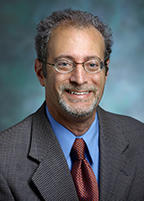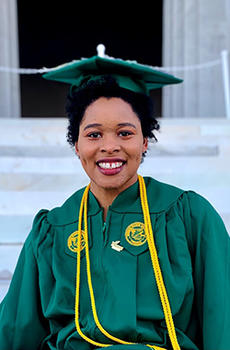In This Story

Preliminary findings from George Mason University research into the impact of COVID-19 on the health of under-resourced and underrepresented college students suggest students are eating more meals at home, making healthier eating choices, and exercising outside more. But study participants said they more frequently ate due to boredom.
Students and faculty from the Department of Nutrition and Food Studies in Mason’s College of Health and Human Services are conducting the research with the help of a Summer Team Impact Project Award from the Office of Student Scholarship, Creative Activities and Research (OSCAR), and results are expected to be released next month.
Lawrence Cheskin, Nutrition and Food Studies Department chair, is leading the study. Alison Cuellar in the Department of Health Administration and Policy, and Matthew Rossheim, Department of Global and Community Health, are two additional facutly members serving as mentors. Zimako Chuks and Erika Kennedy are two graduate research assistants who are involved in the project. They help to lead, guide and collaborate with the COVID-19 Summer Team Impact Project ’s three paid undergraduate researchers, and five volunteers.

The researchers interviewed about 155 students to learn about the effects of COVID-19 on minority, poor, underserved, and under-represented students. Kennedy said they reached out to more than 9,760 Mason students ages 18 to 24 to schedule in-person and online interviews.
“One of the really cool parts of the Summer Team Impact Project is that researchers and volunteers have been split into four groups—housing security/economic stability, substance use, LGBTQ+ health and well-being, and food security—and they are looking at a specific key element of students’ lives that have been impacted by COVID-19,” said Kennedy, who is working on her master’s degree in public health and epidemiology. “We’re also looking at interviews and writing a paper we hope to have published in a journal at the end of the summer.”
The research, which began in early June, includes questions for participants on changes in physical health, exercise, eating habits, food shortages, weight gain, weight loss, and other physical elements.
Chuks, a master’s student in public health and epidemiology, said the biggest takeaway from this research will be the oral histories it generates.

“We really wanted students to write their own oral history and get their perspective,” Chuks said. The researchers hope to use those oral histories to share online class experiences, how being away from campus affected the learning experience, and more.
For many students, Chuks said, “This is the first time students have been able to talk about their experience with someone outside of their friend group or family.”
Kennedy said they hope to implement an intervention after they determine the impact on minority and under-resourced student groups.
Cheskin suspects findings will conclude that poor and minority groups will be more vulnerable to weight gain as a result of COVID-19. He said pandemic weight gain appears to be prominent in more developed countries than less developed areas of the world. Minorities and poor populations are more susceptible to infection and death from COVID-19, he added.
“The OSCAR Summer Team Impact Project is a vital program that connects Mason’s undergraduate students with the cutting-edge research that is happening across the campus,” said Jesse Guessford, associate director of undergraduate education in the Office of the Provost.
“The point of the Summer Impact Project is to give students research experience on campus before they graduate and go out in the real world,” said Kennedy.
